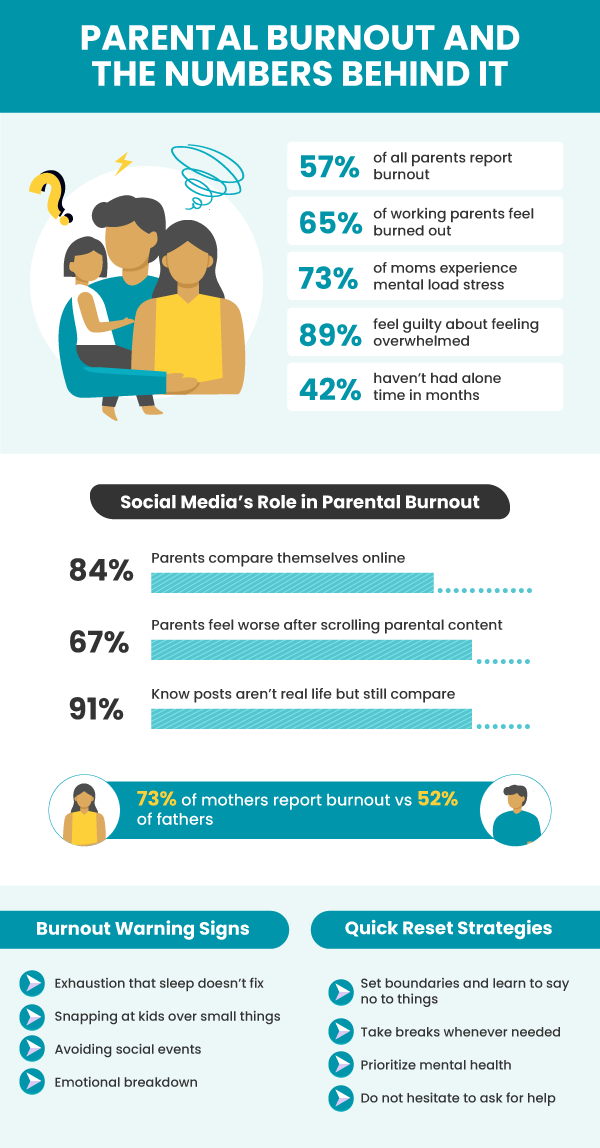Parental burnout is when it is 2 AM and you’re standing in your kitchen making your third cup of coffee, wondering if you’ve officially lost your mind. Your teenager hasn’t spoken to you in three days except to ask for money.
Here’s the truth that nobody talks about at those perfect playgroup gatherings: you’re not losing your mind. You’re not a bad parent. You’re experiencing something that has a name, and it’s more common than you think – parental burnout.
The Problem That Nobody Wants to Admit
We live in a world where parenting is supposed to be an Instagram-worthy journey of tiny milestones and precious moments. But what happens when the reality of parenting feels more like running a 24/7 business where your kids never listen or are never satisfied, and society’s expectations keep changing the rules?
You end up completely exhausted, emotionally drained, and wondering what happened to the person you used to be. You feel guilty for feeling this way because “shouldn’t parenthood be the most rewarding thing ever?”
Recent research shows that 57% of parents self-reported experiencing burnout, and among working parents, that number jumps to a staggering 65%. These are real parents, probably just like you, who are struggling to keep their heads above water.
What Exactly Is Parental Burnout
Parental burnout comes from enduring stress and the relentless demands of parenting, resulting in physical, emotional, and mental exhaustion. It’s not just being tired after a long day – it’s a deeper kind of exhaustion that sleep doesn’t fix.
If regular parenting stress is like running a marathon, parental burnout is like running that marathon every single day with no finish line in sight. It falls somewhere between stress and depression, and sufferers can experience symptoms of physical and emotional exhaustion.
Why Is This Happening to So Many Parents
- Performance Pressure: Social media shows us highlight reels of other families, parenting blogs tell us about all the things we should be doing, and somewhere along the way, we started believing that good parenting means doing everything perfectly all the time.
- The Mental Load: This one hits mothers particularly hard. It’s not just about doing the physical tasks of parenting – it’s about remembering everything, planning everything, and being the family’s emotional and logistical CEO while also trying to be a perfect parent, partner, and possibly employee.
- Work-Life Balance That Doesn’t Balance: With 65% of working parents reporting burnout, it’s clear that trying to juggle career demands with parenting responsibilities is taking a serious toll. Work-life balance often feels like a myth when your kid gets sick the day of your biggest presentation.
- Comparison Game: Thanks to social media, we’re constantly comparing our behind-the-scenes reality to everyone else’s highlight reel. That mom posting about her homemade organic baby food while you’re hiding in the pantry eating crackers for dinner? She’s probably having her own struggles too.

How to Hit the Reset Button
Parental burnout isn’t permanent, and there are practical ways to start feeling like yourself again. Here’s how to begin your reset:
Start Small: You don’t need to overhaul your entire life overnight. Pick one small thing you can change today. Maybe it’s asking for help with dinner, taking a 10-minute walk alone, or saying no to one commitment this week.
Get Real About Expectations: Nobody is posting about their kid’s meltdown in Target or the day they served cereal for dinner. Everyone is just figuring it out as they go. Give yourself permission to be imperfect.
Build Your Community: This might mean reaching out to family, connecting with other parents in your area, hiring help if you can afford it, or joining online communities where you can be honest about the struggles of parenting.
Set Boundaries: It’s okay to say no to activities, playdates, or commitments that drain your energy. It’s okay to let your house be messy sometimes. It’s okay to use screen time as a babysitter when you need a break.
Ask for Professional Help: If you’re feeling overwhelmed, talking to a therapist who understands parental burnout can be incredibly helpful. There’s no shame in getting support – it’s actually one of the smartest things you can do for your family.
Remember Your Identity: You’re not just a parent – you’re a person with interests, dreams, and needs. Reconnecting with parts of yourself that exist outside of parenting can help you feel more balanced and fulfilled.
The Path Forward
Parental burnout is real, it’s common, and it’s not your fault. But it’s also not permanent. The fact that you’re reading this and recognizing yourself in these words means you’re already taking the first step toward feeling better.
Recovery from parental burnout isn’t about becoming a perfect parent. It is about becoming a sustainable one. It’s about finding ways to take care of yourself so you can show up for your family without completely losing yourself in the process.
Remember, taking care of yourself is necessary. Your kids need you to be okay more than they need you to be perfect. When you start prioritizing your own well-being, you’re not just helping yourself; you’re modeling healthy behavior for your children and creating a more peaceful home for everyone.
The journey out of parental burnout takes time, and it’s rarely a straight line. Some days will be better than others, and that’s completely normal. What matters is that you’re aware of what’s happening and you’re taking steps to address it.
What’s Next: The Power of Your Voice
While we’ve talked about hitting your personal reset button, there’s something bigger happening in the world of parenting that you should know about. Companies are finally starting to realize that parents’ real experiences and honest feedback are incredibly valuable for creating products and services that actually work for families.
Your struggles with parental burnout, your daily parenting challenges, and your insights about what would make family life easier – all of that matters more than you might think. Brands are beginning to understand that the best way to create products for parents is to actually listen to parents.
In our next blog, we’ll explore how your real parent feedback is revolutionizing product design and how you can be part of this movement. Because your voice as a parent matters, and companies are finally starting to listen.









